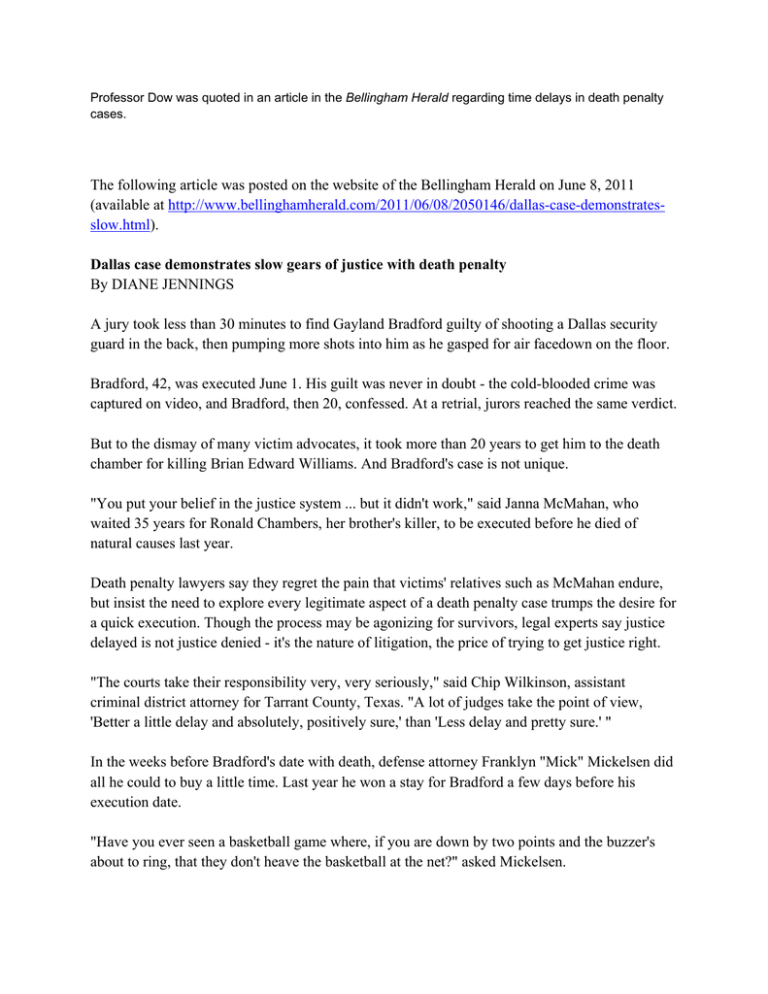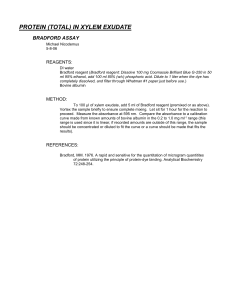The following article was posted on the website of the... (available at
advertisement

Professor Dow was quoted in an article in the Bellingham Herald regarding time delays in death penalty cases. The following article was posted on the website of the Bellingham Herald on June 8, 2011 (available at http://www.bellinghamherald.com/2011/06/08/2050146/dallas-case-demonstratesslow.html). Dallas case demonstrates slow gears of justice with death penalty By DIANE JENNINGS A jury took less than 30 minutes to find Gayland Bradford guilty of shooting a Dallas security guard in the back, then pumping more shots into him as he gasped for air facedown on the floor. Bradford, 42, was executed June 1. His guilt was never in doubt - the cold-blooded crime was captured on video, and Bradford, then 20, confessed. At a retrial, jurors reached the same verdict. But to the dismay of many victim advocates, it took more than 20 years to get him to the death chamber for killing Brian Edward Williams. And Bradford's case is not unique. "You put your belief in the justice system ... but it didn't work," said Janna McMahan, who waited 35 years for Ronald Chambers, her brother's killer, to be executed before he died of natural causes last year. Death penalty lawyers say they regret the pain that victims' relatives such as McMahan endure, but insist the need to explore every legitimate aspect of a death penalty case trumps the desire for a quick execution. Though the process may be agonizing for survivors, legal experts say justice delayed is not justice denied - it's the nature of litigation, the price of trying to get justice right. "The courts take their responsibility very, very seriously," said Chip Wilkinson, assistant criminal district attorney for Tarrant County, Texas. "A lot of judges take the point of view, 'Better a little delay and absolutely, positively sure,' than 'Less delay and pretty sure.' " In the weeks before Bradford's date with death, defense attorney Franklyn "Mick" Mickelsen did all he could to buy a little time. Last year he won a stay for Bradford a few days before his execution date. "Have you ever seen a basketball game where, if you are down by two points and the buzzer's about to ring, that they don't heave the basketball at the net?" asked Mickelsen. Throwing long shots on behalf of a condemned man is not "for the purpose of delay," Mickelsen stressed. "I'm ethically obligated." He said he uses judgment about what issues to raise, however, and doesn't bring up an issue unless it's something he feels the courts need to address. Defense attorneys try to identify issues that might result in a life sentence instead of death or that might keep their clients alive long enough for another issue to surface. "There are no frivolous issues when you're trying to save another man's life," said Patrick Metze, director of the Capital Punishment Clinic at Texas Tech School of Law. The average length of stay on death row in Texas is 10.6 years. That's about the same as the national average, according to the Death Penalty Information Center. But that's "still too long," said Kent Scheidegger, legal director of the Criminal Justice Legal Foundation. "We do need to get it right, but getting it right does not take nearly as long as we are presently taking." In April, a Dallas judge took the death penalty off the table in the retrial of Jonathan Bruce Reed because too much time has passed since the crime. After 32 years, witnesses and records are no longer available to use as evidence about his upbringing that could exempt him from the death penalty. "I have never seen delay benefit the state," said Roe Wilson, assistant district attorney for Harris County, who has been handling capital cases for more than a quarter-century. "What happens is, death penalty law changes; the way courts interpret a particular issue will change." For instance, in 2002, the execution of the mentally retarded was declared unconstitutional after decades of debate. Three years later, the execution of convicts for crimes committed when they were under age 18 was abolished. Anyone who could be determined to be mentally retarded and those convicts who did their crimes as juveniles were removed from death row. "The longer you keep your guy alive, the more things are going to happen," said David Dow, litigation director of the Texas Defender Service. "I can't think of how many guys I represented in the '90s who were clearly mentally retarded, but it was a big number," he said. "If we'd kept them alive until after 2003, then they'd still be alive." Some death row inmates have had multiple trials and come within minutes of execution. Ronald Chambers, the man who murdered Janna McMahan's brother Mike in 1975, was given four trials as the law evolved. A second trial was ordered in 1983 because a state-appointed psychiatrist failed to warn Chambers his answers to questions could be used against him. A third trial was ordered in 1992 because prosecutors improperly excluded African-Americans from the second jury. A fourth punishment trial was scheduled for 2011 because jurors were not properly instructed on how to consider mitigating evidence. Chambers' case exemplifies why delay is the name of the game for defense attorneys. He died in jail of natural causes. "What makes me mad is the criminal gets all of the advantages," McMahan said. "Everybody's due a fair trial," she said, but she is frustrated that changes in the law can affect already tried cases. Defense lawyers vehemently disagree, saying court-appointed attorneys used by most defendants usually are outgunned by the overwhelming power and vast resources of the state. In addition, the number of appeals and length of time to raise appeal issues has been limited by changes to the law in the 1990s. At first, those changes streamlined the process, said Tarrant County's Wilkinson, but exceptions to the new rules were quickly carved out by the courts. Another veteran prosecutor, Bill Delmore, assistant district attorney in Montgomery County, Texas, said that more than three decades after capital punishment was reinstated, he is "a little bit surprised that the prosecution has not become smoother." "Attorneys have gotten very inventive about raising new issues," Delmore said. Defense attorneys are constantly on the lookout for valid topics, which they bring up repeatedly. "Persistence is indispensable," said Rob Owen, co-director of the Capital Punishment Clinic at the University of Texas School of Law. "You've got to keep raising it. If you don't, the court isn't going to do it for you." For example, one issue that keeps resurfacing every time it seems settled is whether the lethal injection drug cocktail is cruel. In 2008, the U.S. Supreme Court ruled that it is not, but as states change the drugs, defense attorneys are making another run at the issue. While many observers don't expect new appeals on lethal injection to go far, they're keeping a close eye on other issues. Dow expects the courts will have to confront the role of mental illness in the years ahead, specifically the role of post-traumatic stress disorder in capital cases. Metze expects the court will eventually re-examine raising the cutoff age for capital punishment from 18. Some research shows that adolescent brains don't fully develop by then. An issue that Wilkinson said "puts terror in the hearts" of appellate attorneys is whether defendants are entitled to "effective" assistance of counsel on a state writ of habeas corpus. Under current law, attorneys must be "effective" at trial, meaning their entire performance during the trial can be reviewed and used as a basis for reversal. If that same performance measure is demanded for a writ seeking re-examination of the entire case, "you're adding an entirely new level of review," Wilkinson said. Ineffective assistance of counsel when another attorney was asking a court to re-examine the Bradford case was the issue Mickelsen raised in his last-ditch effort to keep Gayland Bradford alive. Bradford previously had a "baby lawyer" for that habeas corpus writ proceeding, Mickelsen argued, and that lawyer didn't bring up issues for review that should have been raised. Courts have previously declined to grant relief on that issue, but Mickelsen asked them to reconsider it in Bradford's case. Mickelsen acknowledged the issue was a long shot, but a legitimate one to raise. "I just have to play the game," he said. "As long as I have shots to make, I make 'em." But on May 27 the U.S. Supreme Court denied Bradford's request for a stay to file a petition for rehearing. Mickelsen said he had no more issues to raise. Read more: http://www.bellinghamherald.com/2011/06/08/2050146/dallas-case-demonstratesslow.html#ixzz1Omp1DZi8






